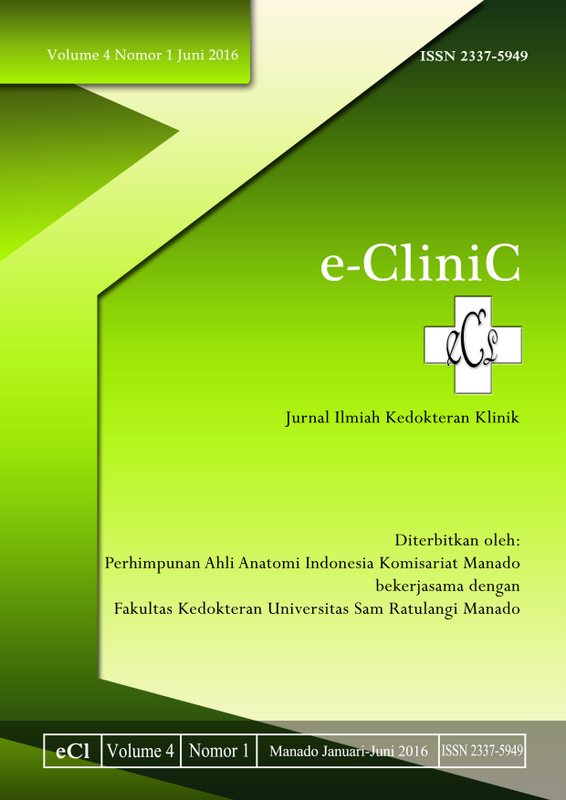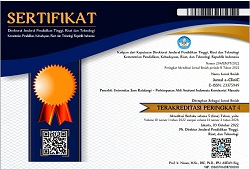Gambaran Derajat Hipertensi Pada Pasien Sindrom Koroner Akut (SKA) di RSUP PROF. R. D. Kandou Manado Periode Januari - Desember 2014
DOI:
https://doi.org/10.35790/ecl.v4i1.11028Abstract
Abstract : Acute Coronary Syndrome (ACS) is an uncomfortable condition or other symptoms in the chest due to lack of oxygen consumption in myocardium. Risk factors of acute coronary syndrome divided to two are modifiable risk factors and non- modifiable risk factors. Modifiable risk factors like hypertension, cholesterol, smoke, obesity, diabetes mellitus, hyperuricemia, physical inactivity, stress and life style. Non- modifiable risk factors like ages, gender, and family history disease. The purpose of this research is to know degree of hypertension and prevalence of hypertension in patient with acute coronary syndrome on RSUP Prof. R. D. Kandou Manado. This research used the observational descriptive method with cross sectional approach. Total sample of this research are 86 patients. The data have been collected by see patient’s medical record. The result showed 86 patient acute coronary syndrome where total of unstable angina pectoris were 47 patients, total of non ST elevation myocardial infarction were 20 patients, and total of ST elevation myocardial infarction were 19 patients. 60 cases were man and 28 cases were woman. 34 cases were pre-hypertension, 43 cases were hypertension stage 1, and 9 cases were hypertension stage 2. The majority of acute coronary syndrome cases were 56-65 years old.
Keywords : acute coronary syndrome, degree of hypertension
Abstrak : Sindrom Koroner Akut (SKA) adalah sebuah kondisi yang melibatkan ketidaknyamanan pada dada atau gejala lain yang disebabkan oleh kurangnya oksigen ke otot jantung (miokardium). Faktor risiko SKA dapat dibagi dua yaitu faktor risiko yang dapat bisa diubah (modifiable), yaitu: hipertensi, kolesterol, merokok, obesitas, diabetes mellitus, hiperurisemia, aktivitas fisik kurang, stress, dan gaya hidup (life style). Faktor risiko yang tidak dapat diperbaiki seperti usia, jenis kelamin, dan riwayat penyakit keluarga. Tujuan penelitian ini untuk mengetahui gambaran derajat hipertensi dan prevalensi hipertensi pada pasien Sindrom Koroner Akut (SKA) di RSUP Prof. Dr. R. D kandou Manado. Penelitian ini merupakan jenis penelitian retrospektif observasional, dengan pendekatan cross sectional. Sampel penelitian sebanyak 86 pasien. Pengambilan data dilakukan dengan melihat catatan rekam medik pasien. Hasil penelitian didapatkan 86 penderita sindrom koroner akut dimana jumlah penderita angina pektoris tidak stabil adalah 47 orang, jumlah penderita infark miokard akut tanpa elevasi segmen ST adalah 20 orang, dan jumlah penderita infark miokard akut dengan elevasi segmen ST adalah 19 orang. Penderita sindrom koroner akut yang berjenis kelamin laki-laki adalah 60 orang, sedangkan perempuan berjumlah 26 orang. Terdapat 34 orang yang termasuk didalam pre-hipertensi, 43 orang dengan Hipertensi derajat 1, dan 9 orang termasuk Hipertensi derjat 2. Kelompok usia terbanyak sindrom koroner akut adalah 56-65 tahun.
Kata Kunci : Sindrom Koroner Akut, Derajat Hipertensi
Downloads
How to Cite
Issue
Section
License
COPYRIGHT
Authors who publish with this journal agree to the following terms:
Authors hold their copyright and grant this journal the privilege of first publication, with the work simultaneously licensed under a Creative Commons Attribution License that permits others to impart the work with an acknowledgment of the work's origin and initial publication by this journal.
Authors can enter into separate or additional contractual arrangements for the non-exclusive distribution of the journal's published version of the work (for example, post it to an institutional repository or publish it in a book), with an acknowledgment of its underlying publication in this journal.
Authors are permitted and encouraged to post their work online (for example, in institutional repositories or on their website) as it can lead to productive exchanges, as well as earlier and greater citation of the published work (See The Effect of Open Access).







